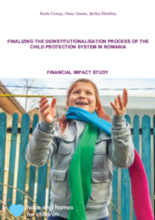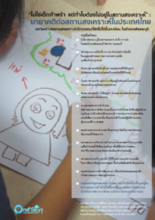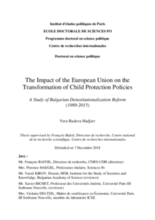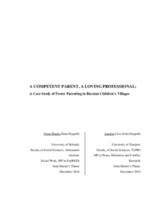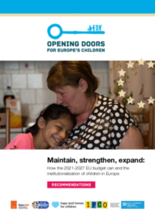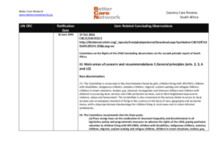Displaying 211 - 220 of 678
This study analyzes longitudinal statistics from 18 years of Hope and Homes for Children programs in Romania to demonstrate the cost savings and ability to support a higher number of children at risk if the state were to invest money into programs that allow children to remain in a family environment, rather than be placed in institutional care.
This summary report presents key findings and recommendations from an analysis of unregistered, private children's homes in Thailand's Sangkhlaburi District.
This doctoral research explores how the European Union membership has changed the post-communist heritage of institutional care in Bulgaria, focusing on the transformation of orphanages through the deinstitutionalization reform
Using data from Ghana—a country that has initiated reintegration of children from residential care facilities, therefore providing a natural opportunity for comparative research—the authors of this study from the Children and Youth Services Review used hope, whether the child has been reunified with family/caregivers or remained in the care facility, and a statistical interaction of the two, along with controls, to predict the Child Status Index, an internationally-established measure of child wellbeing.
This thesis takes a range of Russian Children’s Villages as its case study in an attempt to investigate foster parents’ perceptions of parenting and thus shed light on the present-day development of the alternative care system in Russia.
These recommendations have been developed by the Opening Doors for Europe’s Children campaign and are based on the work of the campaign since 2016, calling for a stronger commitment to maintain, strengthen and expand the use of EU funds for deinstitutionalisation reforms in Europe.
In this video, Dr. Kristen Cheney discusses how her work led her to study the growth of the Orphan Industrial Complex and its adverse effects on children, families, communities, and child protection systems.
Using the data from a a nationwide evaluation of accessibility of employment and education in Latvia, the authors of this paper argue that due to the fragmented implementation of deinstitutionalisation (DI) and lack of a child centred approach throughout the education sector, despite educators firmly believing they are acting in the best interests of children, current practices of care contribute to the creation of ‘inclusive exclusion’
This country care review includes the care-related Concluding Observations adopted by the Committee on the Rights of Persons with Disabilities.
This country care review includes the care-related Concluding Observations adopted by the Committee on the Rights of the Child and the Committee on the Rights of Persons with Disabilities.

